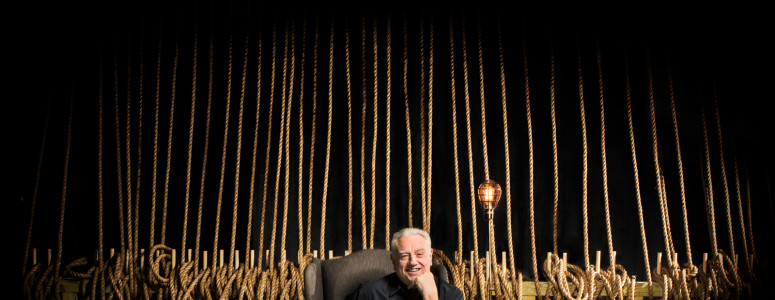The subtitle is extraordinarily important.
For if you’ve heard that Ed Dixon is doing a one-man show on the life of actor George Rose (1920-1988), you may assume that he’ll take the stage AS the two-time Tony-winner.
No. Dixon’s play is called GEORGIE, but the subtitle is MY ADVENTURES WITH GEORGE ROSE. So Dixon, casually dressed in an untucked black shirt over ordinary gray pants, portrays himself. He simply tells of the 15 years that he knew the distinguished performer, first as a castmate and eventually as a bosom buddy.
Even after the friendship was reaching its second decade, Dixon reports in an awe-filled voice, “I still could not believe I knew him.”
It all began with their both being hired for a revival of THE STUDENT PRINCE that went on a pre-Broadway tryout in 1973. The friendship lasted longer than the show, which closed out-of-town — or, as Dixon puts it, demonstrating that he’s as good a writer as a performer, “We hit a bump in the road show.”
Dixon’s hero-worship for Rose’s acting abilities was bigger than the sign over the Winter Garden. Among the many instances he gives of the man’s greatness is his noting that Rose “would not so much cajole but insist” that an audience respond to him.
That Rose was an expert raconteur also drew Dixon to him. As he says, “I was that kid” who loved hearing any and all theater tales. And did Rose have them! The stories ranged from Rose’s appearances in comedies (MY FAT FRIEND), plays (A MAN FOR ALL SEASONS) and musicals (MY FAIR LADY and THE MYSTERY OF EDWIN DROOD, which resulted in those Tonys). There were juicy-to-snarky comments on Katharine Hepburn’s singing voice in COCO, Rex Harrison’s intractability and Gladys Cooper’s unapologetic alcoholism.
Along the way, Rose gave Dixon a good deal of sage advice — “Being famous is not the same as being good” — and displayed even more eccentricities; his two ferocious dogs were just the tip of the menagerie. What Dixon may have found most valuable of all was Rose’s unabashed openness about his homosexuality. Stonewall had happened four years before they met, but plenty of gays weren’t yet out. Dixon isn’t on-the-nose specific, but he gives the impression that he was semi-closeted at the time, so he highly admired Rose’s who-gives-a-damn attitude.
Should we infer that Rose also taught Dixon how to tell a good story? Whether he did or not, Dixon knows how to get us to laugh when detailing his own theatrical forays. He lets us know that MY FAVORITE MARTIAN’s Ray Walston was far from his favorite co-worker. When he replicates Rose’s “With a Little Bit of Luck,” he moves his eyeballs to the corners of the sockets to underline his insouciant ease with the song.
At other times Dixon brings Jack Benny to mind. If you remember that comedian, you’ll recall that oftentimes when he was talking to someone and heard an observation that surprised him, he’d respond by giving a slow turn-of-head away from the speaker, then directly look at the audience and stare as if to say “Can you believe what you just heard?” Dixon does much the same thing, although, of course, he does it after he’s been “talking” and “spoken to” an imaginary on-stage person.
Sondheim says, “Sometimes people leave you halfway through the wood.” For Dixon, outside of a Dominican Republic airport moments after he’d arrived was when he wanted to leave Rose — and after promising the actor he’d stay with him for two weeks. We all have our dark sides, but Rose’s was particularly murky and you’ll undoubtedly find yourself seeing why Dixon wanted to make a speedy exit.
Most of GEORGIE, however, is great fun – especially for theater enthusiasts who, like Dixon, can’t get enough backstage lore. If you fit the profile, you’ll find that with a little bit of luck, you’ll be able to get a ticket at the intimate Davenport Loft.




